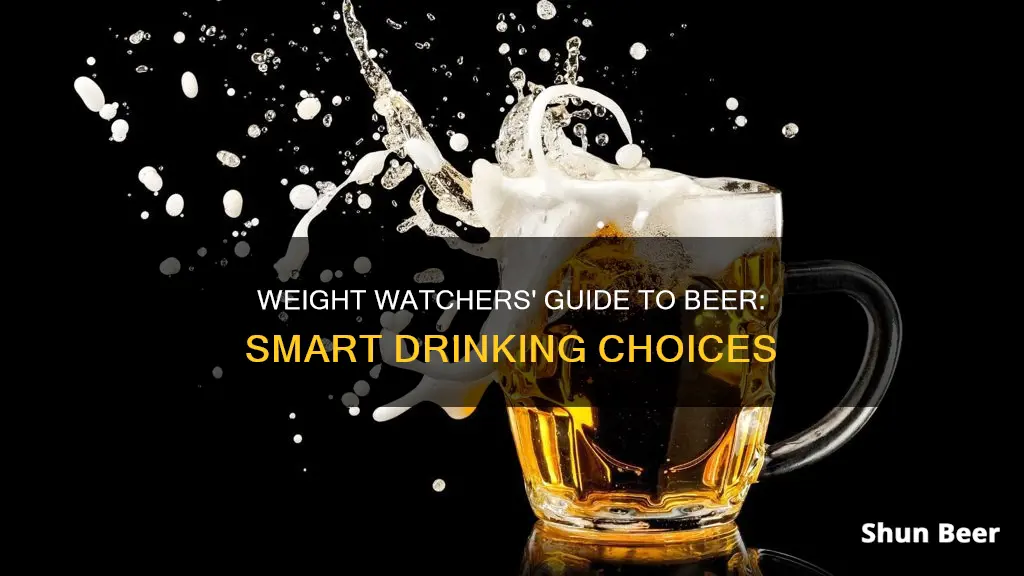
Beer is widely believed to contribute to weight gain, resulting in the notorious beer belly. However, this is a myth, according to Charlie Bamforth, a professor at the University of California, Davis. Bamforth explains that weight gain from drinking beer occurs when an individual's total calorie intake is too high and they don't burn off those calories. While beer is calorie-dense, packing seven calories per gram, it's no more caloric than other alcoholic drinks. When following a weight-loss programme like Weight Watchers, it's important to monitor alcohol intake, as alcoholic drinks tend to be high in calories and sugar. However, occasional alcoholic drinks are allowed in moderation, and certain beers can fit into a daily Points target or budget.
| Characteristics | Values |
|---|---|
| Average 12-ounce beer with 5% alcohol by volume | 5 Points |
| Typical 16-ounce draft pint | 6 Points |
| Most 12-ounce "light" beers | 3 Points |
| 16-ounce pint of light beer | 4 Points |
| 12-ounce non-alcoholic beer | 2 Points |
| Popular beer brands with 3 (or fewer) Points | Heineken Premium Light, Milwaukee's Best Light, Coors Light, Grolsch Light, Miller Lite, Yuengling Light Lager |
| Popular beer brands with 5 (or more) Points | Peroni Nastro Azzurro, Pabst Blue Ribbon (PBR), Blue Moon Belgian White, Guinness Draught Stout (Pasturized) |
What You'll Learn

Light beer is a good option
A 12-ounce serving of light beer will cost you around 3 to 5 SmartPoints, depending on the brand. Popular light beer options within this SmartPoints range include Heineken Premium Light, Coors Light, Miller Lite, Corona Light, Michelob Ultra, Bud Light, and Sam Adams Light.
When following the Weight Watchers program, it's important to monitor your alcohol intake and make informed choices. Alcoholic drinks are typically high in calories, with 7 calories per gram, and can contribute to weight gain if consumed in excess. However, light beers offer a lower-calorie option that can fit within your daily Points budget.
In addition to being lower in calories, light beers are also widely available. Whether you're at a barbecue, a bar, or a friend's house, you can usually find light beer as an option. This makes it a convenient choice when you're looking for a drink that fits within your Points allowance.
So, if you're a beer lover on Weight Watchers, light beer is definitely an option to consider. Just remember to drink in moderation and be mindful of your overall calorie intake to ensure you stay on track with your weight loss goals.
Beer Overload: Low Sodium Levels?
You may want to see also

Beer bellies are a myth
The idea that beer causes potbellies, or "beer bellies", is a myth. While beer drinkers across the globe tend to develop larger bellies as they age, this is not due to the beer itself. Beer does not contain fat, and a study of nearly 2,000 adults in the Czech Republic found no link between beer consumption and waist circumference.
Instead, the culprit is simply an excess of calories. Beer contains calories, and it is easy to drink several in one sitting, leading to a calorie overload. Alcohol also increases your appetite, and the foods typically consumed with beer, such as pizza and fried foods, are often high in calories. However, any excess calories, whether from alcohol, sugary drinks, or large portions of food, can increase belly fat.
The reason beer is often blamed for belly fat is that it is calorie-dense, with seven calories per gram, almost as much as fat, which has nine calories per gram. The stronger the beer, the more calories it contains. A typical beer has around 150 calories, while a light beer has around 110. However, a glass of wine or a shot of liquor also has around 100 calories, so regular beer does not contain significantly more calories than other alcoholic drinks.
The key factor in weight gain is not how much fat you consume but how many calories you take in versus how many you use up. If you consume more calories than you burn, your body will store the excess as fat. Where your body stores that fat is determined by your age, sex, and hormones. Men tend to store more fat in their bellies, which is why they are more prone to developing "beer bellies".
To avoid gaining a belly, it is important to maintain a balanced diet and lifestyle and ensure your total calorie intake is not too high. While beer and other alcoholic drinks can be enjoyed in moderation, they should be consumed in conjunction with physical activity and a healthy diet.
Beer and Bulking: What's the Verdict?
You may want to see also

Beer is calorie-dense
Beer is made from fermented grain, and the calories in beer come mainly from carbohydrates and alcohol. The stronger the beer, the more calories it contains. Alcohol is calorie-dense, with seven calories per gram, almost as much as fat, which has nine calories per gram.
Craft beers, seasonal beers, and beers with high alcohol content tend to have more calories than lighter beers. Beers with added sugar also have extra calories. A classic beer with an average alcohol content of around 5% has about 43 kilocalories per 100ml.
Compared to other alcoholic drinks, beer is one of the least calorie-dense options. For example, a regular beer contains 43kcal per 100ml, while absinthe has 348kcal per 100ml. However, if you're watching your weight, it's important to drink in moderation. Heavy beer consumption will contribute to weight gain, including belly fat.
If you're looking for lower-calorie beers, opt for non-alcoholic or light beers. However, be aware that the terms "light" and "lite" have no legal definition and may not always indicate a lower calorie count. Instead, look for the percentage of alcohol by volume (ABV) on the label and choose beers with a lower ABV. You can also look for beers labelled as "low-carb", which must have no more than 7 grams of carbohydrates per serving.
Strategies to Help Your Husband Stop Drinking Beer
You may want to see also

Beer has health benefits
Beer is not just a refreshing drink, but it also has several health benefits when consumed in moderation. Here are some reasons why beer can be good for your health:
Rich in Vitamins and Minerals
Beer is an excellent source of B vitamins, particularly folic acid, which is believed to help prevent heart attacks. It also contains soluble fibre, which aids digestion and reduces the absorption of unhealthy substances like fat. Beer is also a good source of magnesium and potassium.
Antioxidant Properties
Beer, especially darker varieties, contains antioxidants that fight free radicals in the body, reducing the risk of chronic conditions and certain forms of cancer. Hops, a key ingredient in beer, is rich in antioxidants, including bitter acids and polyphenols, which also give beer its flavour and aroma.
Improved Cholesterol Levels
Regular and moderate beer consumption can improve your cholesterol levels. Beer has no cholesterol and can increase the levels of "good" HDL cholesterol while reducing "bad" LDL cholesterol. This helps to armour-plate your veins and improve overall heart health.
Social Benefits
The social aspects of moderate drinking can have a positive impact on your health. Socialising and relaxing with friends over a couple of beers can be beneficial for your mental well-being.
Reduced Risk of Heart Disease
Several studies suggest that consuming one to two beers per day may lower the risk of heart disease. Beer can be as effective as wine in improving general heart health when consumed in comparable alcohol amounts.
Improved Blood Sugar Levels
Light to moderate alcohol consumption may help reduce the risk of developing diabetes and improve blood sugar control for people with diabetes. Low-sugar beers, such as light beers, are particularly beneficial in this regard.
Increased Bone Strength
Early research indicates that moderate beer consumption may contribute to stronger bones for men and postmenopausal women. However, excessive consumption can negate these potential health benefits.
Beer and Drunkenness: One Beer, Tipsy or Sober?
You may want to see also

Low-carb beers are best
If you're on Weight Watchers and want to drink beer, it's best to opt for low-carb beers. While beer doesn't give you a "beer belly", it is calorie-dense, with alcohol packing seven calories per gram. That's almost as much as fat, which has nine calories per gram. So, if you're looking to minimise your Points spend while maximising your enjoyment, low-carb beers are the way to go.
Low-carb beers generally have less than 1g of carbs per 100ml. Beers labelled as "light" or "lite" can be a good option, as they tend to have lower carb contents than other beers. However, these terms are not standardised, and their meanings can vary between breweries. So, it's always a good idea to check the nutritional information and look for beers with 5g of carbs or fewer.
Some popular low-carb beers include:
- Beck's Premier Light: With only 3.9g of carbohydrates, this light beer from Beck's Brewery has sweet and fruity flavours, perfect for a hot summer day.
- Corona Premier: This beer from Grupo Modelo in Mexico has fewer calories and carbs than Corona Light, with just 90 calories and 2.6g of carbs.
- Michelob Ultra Pure Gold: This beer has a slightly better nutritional profile than the traditional Michelob Ultra, with just 85 calories and 2.5g of carbs.
- Dogfish Head Slightly Mighty: With only 3.6g of carbs and 95 calories, this low-calorie brew is a great option for IPA fans who want to enjoy a nice hoppy beer without sacrificing their fitness goals.
- Lagunitas DayTime: A light IPA with low alcohol content, this beer still delivers the characteristics of a traditional IPA but with much lower calories and carbs (98 calories and 3g of carbs).
So, if you're on Weight Watchers and craving a beer, go for one of these low-carb options and remember to always drink in moderation!
Public Drinking Laws: Beer in the Park?
You may want to see also
Frequently asked questions
Beer bellies are a total myth, according to experts. If drinking beer affects your weight, it's because your total calorie intake is too high and you're not burning it off.
Alcohol has seven calories per gram, almost as much as fat, which has nine calories per gram. Beer is just about as caloric as any alcoholic beverage. The stronger the beer, the more calories it contains. A regular beer has about 150 calories on average, while a lite beer will have 50-100 calories.
Most 12-ounce "light" beers have three points or SmartPoints. Some popular brands include Heineken Premium Light, Coors Light, Miller Lite, and Corona Light.
The average 12-ounce beer with 5% alcohol by volume is five points or SmartPoints. The typical 16-ounce draft pint is six points or SmartPoints.
While it's not recommended to drink alcohol every day, the occasional alcoholic drink is allowed in moderation. Light beer and wine are good choices as they are widely available and low in points or SmartPoints.







